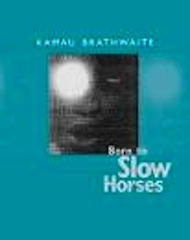
ArtsEtc Inc. 1814-6139
All works copyrighted and may not be reproduced without permission. ©2013 - hoc anno | www.artsetcbarbados.com
All works copyrighted and may not be reproduced without permission. ©2013 - hoc anno | www.artsetcbarbados.com



BORN TO SLOW Horses is a complex collection of poems by Kamau Brathwaite that do not conform to poetic conventions at all. Unlike your typical collection of poetry, there is no labelling of the contents page as such; what the reader gets is a list of the poems with the corresponding page numbers. And what starts off as a pattern with Roman numerals as a symbol of sectional division in the book is subverted when you get to the 6th section (what should be “vi”), which is called “9/11.” All the while, the print of the name of the poems gets bigger as the content list goes on, exemplifying what Brathwaite coins his “Sycorax Video Style.” This style involves the computer manipulation of font size and shape, the construction of different stanza forms, and the addition of images.
All of this further destabilizes poetic and English conventions as Brathwaite makes the bold statement through his work that if Caribbean people do not speak in ways confined by English conventions, then their literary works shouldn’t, either. The Caribbean experience is just as fragmented as our speech suggests, and Brathwaite shows us this fragmentation with his total disregard for grammatical conventions. In many instances, full stops appear sporadically and even sometimes excessively—in replacement of commas, or sometimes there is no explanation within the rules of written English at all. But Caribbean verbal speech contains pauses that are just as sporadic and just as excessive. So, in reality, our words are just as fragmented as Brathwaite’s text and are further emphasized by his unconventional disconnecting of them.
What his Sycorax Video Style does is cement for us how distinctive our speech is from English; it is symbolic of a struggle of displacement, fragmentation and exploitation, and of the strength of Caribbean people in constructing ways to survive and triumph collectively. Born to Slow Horses, which won the 2006 Griffin Poetry Prize, isn’t just about one country in the Caribbean, like Brathwaite’s homeland, Barbados, but borrows aspects from many others, (say, Jamaica) through the use of their speech and cultural practices in poems such as “Kumina.”
“Kumina” is prefaced by an excerpt explaining it as a spiritual journey that incorporates dance, music and language. Brathwaite highlights this for its closeness to African cultural experiences, but he never limits his focus. Born to Slow Horses’ first section is about travel and journey, and throughout the book we see Brathwaite travelling from island to island and beyond the Caribbean, so much so that he takes the reader right into the middle of New York City, where he tackles themes of trauma, memory and grief surrounding the terrorist attacks of September 11, 2001, on the United States. Brathwaite’s language throughout the collection changes as the space of the poem changes; we see this clearly when he moves out of the Caribbean. And as with many of the poems, the 9/11 poem “Hawk” often feels like you’re reading several poems at once, hearing several voices, or being witness to several perspectives.
There is no denying Brathwaite’s emphasis on the collective experience through his work, especially when it comes to the Caribbean. He involves both African and British aspects of culture and, by extension, speech. In the poem “Bread,” which is one of the more complex in the collection and my personal favourite, the speaker alludes to this connectivity: “a dark skin is a chain but it cannot recall the name/ of its tribe….” This sentiment also speaks to the disconnect in historical memory as a result of slavery. Despite what was lost, those who were enslaved found ways to keep memory alive by embedding African beliefs in British traditions.
So we may not know the tribe, but we know each other by our skins, and this recognition gives us a connection that has the potential to take us back in time. A dark skin links our histories, cultures and islands; it links our social experiences…our very beings. I was reminded of how I found myself reacting whenever I saw another black person while studying in Canada. It was increasingly soothing, and I came to feel connected, strong, and powerful. It was an emotional charge that reminded me that no matter what I’m going through, no matter how alone I may feel because of strange surroundings, I am part of a legacy of triumph.
Brathwaite has that ability to ignite our power, to strengthen our racial and cultural identities. Born to Slow Horses stands as a testament to that. Brathwaite’s immense knowledge of language makes him virtually unparalleled in its transcription, and there aren’t many writers who capture the Caribbean voice in the way he does on paper. This collection speaks for itself: in the many voices of the everyday individual.
Racquel Griffith is a young Barbadian poet who is completing a bachelor’s in Literature at the University of the West Indies, Cave Hill. She was the joint winner of the 2012 Irving Burgie Award, a recipient of a Canada-CARICOM Leadership Scholarship in 2013, and participated in ArtsEtc’s 2013 Green Readings series.
